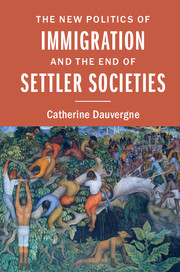3 - The asylum crisis
from PART 1 - THE END OF SETTLER SOCIETIES
Published online by Cambridge University Press: 05 March 2016
Summary
The asylum crisis comes from the realization that Western states cannot effectively limit the number of asylum claims they will receive each year. By the mid-1980s the number of people claiming asylum in prosperous Western states was rising sharply. At that initial point Western states made a decision – implicitly or explicitly – that resulted in the rise in asylum numbers having long-term worldwide impacts. That decision, repeated over and over by diverse states, was that the appropriate response to a desire to curtail the number of asylum seekers would be to introduce measures directed at specific features of asylum flows, rather than to withdraw from or seek to alter the legal parameters of international refugee law. This approach has evolved into a profound commitment to international refugee law, which has altered the international framework of global migration. It has also ushered in a contentious and intransigent politics of asylum that was the first harbinger of a new politics of immigration.
International refugee law makes the asylum crisis possible. As I outlined in Chapter 2, the central commitment of refugee law is that people who are refugees must not be returned to countries where they face a risk of being persecuted. The law was negotiated in the immediate aftermath of World War II, and its objective was to resolve the problems of population displacement in Europe and to ensure that the “burden” of displaced populations would be shared between states. The specific contours of the Refugee Convention reflect its historic context in two important ways. First, the Convention does not aim to protect everyone: its protection is extended to individuals who are at risk because of their political views or identity. In this way, refugees as originally conceptualized resemble those who were most victimized and most valorized by the horrors of World War II and the onset of the Cold War: religious and racial and national minorities, dissidents, and resisters. Second, refugee law was initially limited to protecting only people in Europe and only those who were displaced prior to 1951. The Refugee Convention also set up a framework for limiting state responsibilities: decisions are made on an individual basis; states do not have any general responsibilities but, rather, are limited to caring for those who arrive on their territory; and a notion of “burden sharing” is written into the text of the Preamble.
- Type
- Chapter
- Information
- Publisher: Cambridge University PressPrint publication year: 2016



